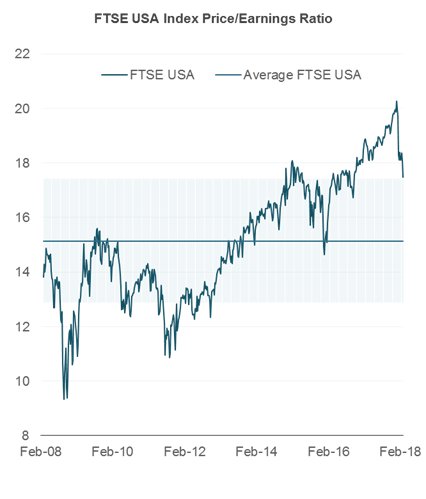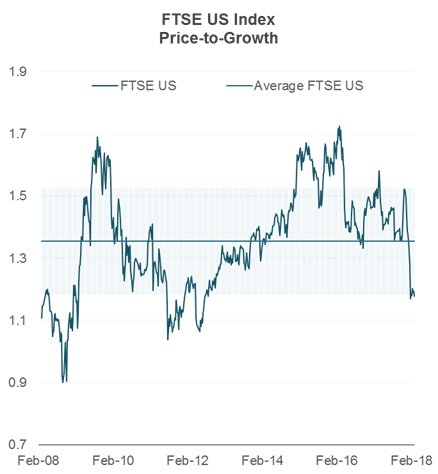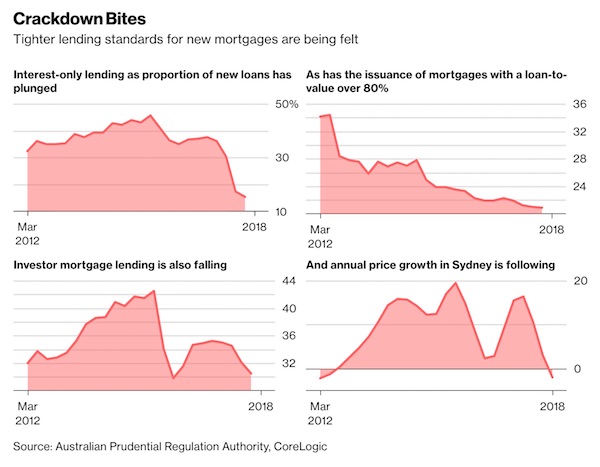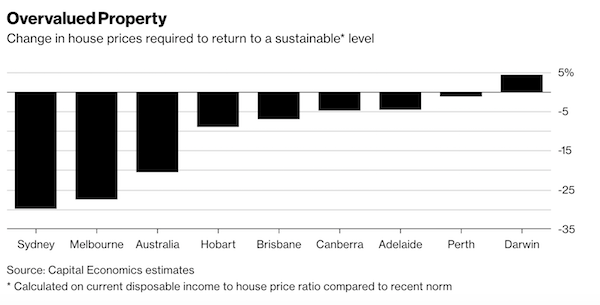
James McNeill Whistler Arrangement in Pink, Red and Purple 1883-4

The new markets.
• US Stock Valuations Are At Multiyear Highs – And Multiyear Lows (MW)
With the start of the first-quarter earnings season, U.S. stock-market investors are waiting to see whether the results point to a business environment that is thriving and supportive of the market’s rally over the past several years, or whether the move has been overdone. Turns out, both bulls and bears have data they can marshal in their favor. According to data from FTSE Russell and Thomson Reuters, the U.S. stock market was recently trading at its most expensive levels since the dot-com era, and — even after the first correction for the DJIA and the S&P 500 in about two years — it continues to trade one standard deviation above a historical range. The data is based on the forward price-to-earnings ratio for stocks, which is currently above 17, compared with the long-term average of about 15.
This measure of valuation can be seen mapped out in the following chart. The recent peak of the forward P/E represented a nearly 20-year high, per FTSE Russell.

In another potential warning sign for investors, the cyclically-adjusted price-to-earnings (CAPE) ratio gives the S&P 500 a ratio of 31.6, nearly twice its long-term mean of 16.85, and at its highest level since the dot-com era. Both of these statistics may give investors pause, as they suggest a market’s that is overstretched and could have more room to fall. However, they only tell half the story. The forward P/E comes at a time when first-quarter earnings growth isn’t just expected to be strong, but coming in at its strongest rate in years. According to FactSet, earnings for companies in the S&P 500 are estimated to grow 17.3% in the first quarter, while sales grow 10%. For both, such rates would represent the fastest pace of growth since the first quarter of 2011.
Accounting for that high level of expansion paints a very different picture for stock valuations, so much so that they go from being at or near multiyear highs, to being at multiyear lows. FTSE Russell also provided the following chart to MarketWatch, which looks at the market in terms of its PEG, or a P/E ratio that accounts for earnings growth. Based on this metric, stocks have a PEG of 1.2, which means they’re not only trading one standard deviation below their long-term average of a little more than 1.3, but also at their cheapest level since 2012.


Really? Killing the golden eggs?
• Australia’s Lending Rules Are About to Batter Home Buyers (BBG)
A toughening of lax lending standards in Australia is threatening an already-cooling property market. An inquiry into misconduct in the financial industry is likely to lead to greater regulation of the nation’s A$1.6 trillion ($1.2 trillion) mortgage market. Banks have routinely relied on an unrealistically low estimate of homebuyers’ living expenses, and a more genuine assessment of spending could reduce borrowing power by as much as 35 percent, according to UBS analysts. That would mean many new buyers simply couldn’t afford current prices – a further drag on home prices that are already falling as a seven-year property boom tails off.
“What drives house prices is credit availability,” said Sean Fenton, director at Sydney-based Tribeca Investment Partners, which manages about A$2.5 billion. “A tightening of lending standards directly impacts the ability of the marginal buyer to buy a house.” The heat is already coming out of the housing market. Prices in Sydney, the world’s second-most expensive property market, fell 2.1 percent in March from a year earlier, according to CoreLogic Inc. A year ago, annual price growth was running at almost 16 percent. The top end of the market has recorded the biggest falls, the data shows.

[..] “It’s really obvious that a lot of people have a lot of unmanageable debt,” said Karen Cox, coordinator of Sydney’s Financial Rights Legal Centre, which fielded 25,000 calls last year from people seeking financial help. “Because it’s such a benign interest rate environment, the problems can only get worse.” Based on historic income and price relationships, property prices in Sydney and Melbourne are overvalued by between 25 percent and 30 percent, according to Paul Dales, chief Australian economist at Capital Economics. For now, he’s predicting prices will just edge lower, with the crunch coming if interest rate increases coincide with tighter credit conditions. “All properties in those cities are particularly vulnerable.”


Macron dreams big. About himself, mostly.
• Macron Says He Convinced Trump To Stay In Syria (AFP)
President Emmanuel Macron asserted Sunday that Paris had convinced Donald Trump to stay engaged in Syria “for the long-term”, adding that French air strikes did not amount to a declaration of war against the regime of Bashar al-Assad. A day after France joined the United States and Britain in launching unprecedented strikes against regime targets, Macron insisted the intervention was legitimate and urged international powers to now push for a diplomatic solution to the brutal seven-year war. “We have not declared war on the regime of Bashar al-Assad,” the 40-year-old centrist said at the start of a combative TV interview, stretching nearly three hours, to mark almost a year in office.
But Macron again argued his first major military intervention as president was necessary to send a signal that the use of chemical weapons against civilians would not go unpunished. Saturday’s strikes targeted three alleged chemical weapons facilities in response to what the West says was a gas attack on the town of Douma that killed dozens of people. “We have full international legitimacy in intervening in this case,” Macron said. He said the US, France and Britain targeted “extremely precise sites of chemical weapons use” in an operation that went off “perfectly”. And he further argued the operation was legitimate despite not being sanctioned by the UN, retorting that under a 2013 UN resolution Syria was supposed to destroy its chemical weapons arsenal. As for his allies, Macron suggested France played a pivotal role in changing Trump’s mind on the need to stay involved in the conflict.

Makes sense.
• Trump Felt Misled, Angry Over Expulsion Of 60 Russian Diplomats (MW)
President Donald Trump erupted in anger when he learned the U.S. was expelling 60 Russian diplomats in March, while France and Germany were only expelling four each, the Washington Post reported late Sunday. Trump reportedly only wanted to match the number of allies’ expulsions, and not to be seen as taking the lead. Trump believed his aides misled him, the Post said. “There were curse words,” one official told the Post, “a lot of curse words.” The expulsions were the most ever by the U.S. against Russia, and came in response to a suspected Russian nerve-agent attack on a former spy and his daughter in England. Separately, the Trump administration appears ready to impose more sanctions on Russia. Nikki Haley, the U.S. ambassador to the United Nations, said Sunday that a new round of sanctions will target Russian companies that aid Syria’s chemical weapons capabilities.

Playing on Trump’s field.
• Comey And Mueller Have Both Fallen Into Trump’s Trap (MW)
If there’s any strategy in the world of President Donald Trump, it’s a simple one: Play on my field. And the Trump playing field is a salacious one. The scandals and affairs are literally too numerous to be chronicled in a single article. Large and small, Trump University to Trump Steaks, bankruptcies and legal judgements, all manner of infidelity and aberrant behavior, real or imagined. Former FBI Director James Comey and Special Counsel Robert Mueller were each charged with looking into an allegation of the most serious variety — colluding with a foreign hostile power to alter the presidential election. This week the headlines emanating from Mueller’s investigation, and Comey’s book, involve a porn star, a Playboy bunny, a pee tape, the size of Trump’s hands and a doorman with a history of fibbing apparently alleging the existence of an illegitimate child.
That is playing on Trump’s field. But wait. Isn’t it a violation of campaign law if Trump’s lawyer Michael Cohen paid off Stormy Daniels just ahead of the election? If Cohen used a home-equity loan to fund the payment, did he lie to the bank? Doesn’t it speak to Trump’s truthfulness on a variety of a matters — including alleged collusion with Russia — whether his persistent denials of engaging with prostitutes in Moscow are truthful? Doesn’t it have relevance to the question of whether payoffs were legal if Trump bought off a doorman? And didn’t Mueller actually hand off the investigation on Daniels? Yeah, sure, all of that. Those are all on the level of the Ken Starr investigation into Bill Clinton’s perjury — legal matters, yes, that aren’t really the stuff of high crimes and misdemeanors.
They’re all gotchas reinforcing what we basically knew about Trump and his behavior before the election. By contrast, the consequences of playing on Trump’s field are enormous. For Comey, baiting Trump into a reaction, which sure as water is wet came on Friday morning, will result in better book sales. But it will come at the expense of holding any future higher office. His legacy as FBI director — already tarnished for the ridiculous, torturous inconsistencies in how he handled the investigation into Hillary Clinton’s emails — is forever tarnished. Who in Washington could hire this guy? “Untruthful,” as Trump called him? No. “Slime ball?” Hmm.
Mueller, too, looks set to emerge damaged, if perhaps not as fatally. The question of whether Trump can, or should, fire him has returned. Mueller, also a former FBI director, does still have the support of both House Speaker Paul Ryan and Senate Majority Leader Mitch McConnell to finish his investigation, and a few key Republicans, including Sen. Chuck Grassley, have expressed willingness to support legislation to protect him. But the idea of his dismissal is definitely more plausible — and, for that matter, the outrage it would generate a good bit lessened.

“..how does it affect children, how does the platform create addiction..”
• A Third Of People Think Facebook Has A ‘Negative Impact On Society’ (MI)
Here’s another bone to pick with Facebook. Nearly one-third of Americans (31.7%) think the embattled social network is having a “negative impact on society,” according to a survey conducted in recent months by CEO Mark Zuckerberg’s former personal pollster, Tavis McGinn. That view was even more widely held among respondents in Australia (33.4%), Canada (33.3%) and the U.K. (32.2%), per the results reported by Recode. The survey research was conducted on 10,000 respondents across 10 nations in January and February, prior to recent revelations that the British data firm Cambridge Analytica had improperly harvested personal data from up to 87 million Facebook users to create targeted political ads.
Facebook had already come under fire for its role in the proliferation of fake news on the platform during the 2016 election. While McGinn and his Honest Data company didn’t delve into specifics of this “negative” societal impact, the pollster had some ideas. “In the U.S. obviously we’re very focused on election interference, and in the U.K. they’ve been focused on that as well with Brexit,” he told Recode. “But there are also things like, ‘how does it affect children, how does the platform create addiction, how does the platform encourage extremism, how does the platform push American values onto other countries?’”

Anyone but you does.
• Who Owns The ‘Virtual You?’ (Escobar)
While GAFA in the US essentially controls the politics limiting the capacity for regulation, Brussels will continue to insist the only path towards healthy regulation comes from the EU. The other model is of course China. Beijing has domesticated its sprawling digital industry – which is a de facto extension of the state apparatus as well as a growing instrument of global influence. When Zuckerberg was asked whether Facebook should be broken up – the monopoly issue once again – he said that would weaken the US’s competitive advantage against China, which by the way is fast disappearing. Facebook’s customer base though is not American; it’s global. Inside the Facebook HQ, the consensus is that it is a global company.
So all these issues at stake – from monopoly to regulation to privacy – are indeed global issues. Zuckerberg dodged extremely serious questions. Who owns “the virtual you?” Zuckerberg’s response was that you own all the “content” you upload, and can delete that content any time you want. Yet the heart of the matter is the advertising profile Facebook builds on each user. That simply cannot be deleted. And the user cannot alter it in any way. The GAFA galaxy, in fact, owns you when you click accepting those massive terms and conditions of use. As argued by philosopher Gaspard Koenig, director of the GenerationLibre think tank in France, data property should logically follow the evolution of property rights, land property, financial property and property of ideas, thus replacing the current figure of the “proletarian 2.0” at the heart of the value chain of the digital economy.

Why would the number be limited to Facebok’s users? Isn’t it clear yet? It’s everyone.
• How Many People Had Their Data Harvested By Cambridge Analytica? (G.)
Statistics are a staple of journalistic accuracy issues, but rarely is a number so big, consequential and hard to verify as the number of Facebook users directly affected by the still emerging Cambridge Analytica story. Is it no more than 30 million, as Cambridge Analytica says? Fifty million, as estimated by the Observer and Guardian journalists who have done so much to disclose the issue? Or 87 million, as Facebook has ventured? Facebook’s estimate has a fine-print caveat: “We do not know precisely what data the app shared with Cambridge Analytica or exactly how many people were impacted. Using as expansive a methodology as possible, this is our best estimate of the maximum number of unique accounts that directly installed the thisisyourdigitallife app as well as those whose data may have been shared with the app by their friends.”
The numbers seem to be calculated by multiplying the number of people known as “seeders” by the average number of Facebook friends seeders are thought to have. A seeder was a Facebook user who installed certain apps that permitted the apps’ controllers to harvest data from the user and the seeder’s (unknowing) Facebook friends. The wide variation in the estimates of people affected results partly from different estimates of seeders – 185,000, 275,000, 300,000 – and different average-number-of-friends figures – 160, 180, 250, 340.
Does it matter, in the sense that it is now evident that many, many other entities – academic, commercial, governmental – could have harvested the data of users under previous Facebook policies, for which Mark Zuckerberg, the company’s ethically callow controller, apologised before committees of the US Congress last week, without apparent loss of face? A sense of perspective was given by the Harvard professor Jonathan Zittrain, a sophisticated observer of the social and democratic impacts of digital technologies: “The Cambridge Analytica dataset from Facebook is itself but a lake within an ocean, a clarifying example of a pervasive but invisible ecosystem where thousands of firms possess billions of data points across hundreds of millions of people – and are able to do lots with it under the public radar.”
[..] Is it unreasonable to wonder whether the potential dataset for the team’s work is 2 billion, the total number of Facebook users?

Former BOE governor sees stormy days ahead. The ECB must save the euro system, and that won’t be easy.
• Where Does the ECB Go From Here? (Mervyn King)
Many observers have drawn comfort from the likelihood that Germany’s new “grand coalition” and French President Emmanuel Macron will indeed reform the basic architecture of monetary union. The language will be warm and encouraging, but the substance less so. In recent months I’ve been struck by the dissonance between, on the one hand, a common French and German determination to move ahead on the principle of reform to the monetary union, and, on the other, their governments’ clashing ideas about how to do it. Macron wants a fiscal union and a finance minister for the euro area. Germany doesn’t: It insists that countries must be responsible for their own fiscal position.
The likely compromise is that any fiscal transfers will be kept as small as possible – no larger than needed to get past the immediate problem. That might suffice in reasonably normal times, but not if market confidence disappears as it did in 2010-12. At that point, the issue can no longer be fudged. As these events unfold, Draghi and his successor, due to take over in October 2019, can expect to face many tests. The rise of populist parties in southern Europe is one — but the greatest challenge is likely to come from opinion in Germany. So far, the monetary union has been good for German exporters and politicians but less so for German consumers, who’ve been denied the higher standard of living that an appreciating currency would have delivered.
[..] U.S. President Lyndon B. Johnson famously remarked about his FBI Director J. Edgar Hoover: “It’s probably better to have him inside the tent pissing out, than outside the tent pissing in.” I’ve no doubt Johnson would be strongly recommending the appointment of Jens Weidmann, the current president of the Bundesbank, and I wouldn’t be surprised if Europe’s governments see it the same way. My advice to Jens? Think twice before accepting.

The NATO Secretary General is a dangerous man. He’s tasked with increasing NATO’s power.
• Stoltenberg Calls On NATO Allies To Provide More Support To Turkey (DS)
NATO Secretary General Jens Stoltenberg drew attention to already existing NATO presence in Turkey and called on all allies to provide more support to the country. “We also provide political support, because Turkey is the NATO ally that has suffered the most from terrorist attacks. NATO immediately condemned the coup attempt that targeted Turkey’s democratic institutions,” the secretary-general said. Stoltenberg spoke to Anadolu Agency (AA) at the NATO headquarters in Brussels ahead of his official visit to Turkey on April 16. The NATO chief said the aim of his trip to Ankara is to “to prepare for the upcoming [NATO] summit in Brussels in July..”
[..] Stoltenberg said he highly values the visit to Turkey, as he sees the country it is “a highly valued and key ally for many reasons, not just for its strategic location.” He added that during the visit he will “discuss the preparations for the important summit where we will address issues like how we continue to adapt NATO to a more demanding security environment.” He said that NATO functions with the solidarity principle “one for all and all for one” and added: “We have deployed missile batteries that are augmenting the missile air defenses of Turkey. We have Italy and Spain deploying Patriot batteries and also SAMP-T batteries, and we conduct surveillance flights with our AWACS planes over Turkey. We have also increased our naval presence in the eastern Mediterranean.
[..] When asked about NATO’s approach to Turkey’s Operation Olive Branch in northwestern Syrian region of Afrin, Stoltenberg said NATO welcomed Turkey’s transparency. “We’re aware that there are some challenges related to the situation in northern Syria and around Afrin. NATO has been a platform for direct dialogue between Turkey and the U.S. We recognize Turkey’s legitimate security concerns, which we expect to be addressed in a proportionate and measured way,” NATO chief said. “We all understand that Turkey has to address these threats. We welcome that Turkey has been transparent and briefed NATO several times on the operation in Afrin, both the military operations and the humanitarian assistance.”

Erdogan gambles on being needed by the US.
• Detained American Pastor Goes On Trial In Turkey (AFP)
An American pastor Monday went on trial in Turkey on terror-related charges after spending the last one-and-a-half years behind bars, in a case that has increased friction between Ankara and Washington. Andrew Brunson, who ran a protestant church in the western city of Izmir, was detained by Turkish authorities in October 2016 and then remanded in custody. If convicted, he risks up to 35 years in jail. Brunson, wearing a white shirt and a black suit, was present in court in the town of Aliaga north of Izmir for the hearing, an AFP correspondent said. In an indication of the importance of the case for Washington, also in court were Sam Brownback, the US ambassador at large for religious freedoms, and Senator Thom Tillis.
Turkish prosecutors have charged Brunson with engaging in activities on behalf of the group led by Muslim preacher Fethullah Gulen, who Ankara says is behind the failed 2016 coup, and the Kurdistan Workers’ Party (PKK). Both are banned by Turkey as terror groups. Brunson is also accused of espionage for political or military purposes. If convicted, he faces two separate terms of 15 years and 20 years in prison, his lawyer Cem Halavurt told AFP. [..] The Brunson case has further raised the temperature of heated relations between NATO allies Turkey and the United States, with US President Donald Trump raising the issue in talks with President Recep Tayyip Erdogan. Relations are already tense over American backing for a Kurdish militia in Syria despised by Ankara and the jailing of two employees at American missions in Turkey.
Gulen, who lives in self-exile in the US state of Pennsylvania, firmly denies any role in the failed coup and says his Hizmet (Service) movement promotes a peaceful form of Islam. Turkey has sent a spate of documents to back up its repeated request for Gulen’s extradition from the United States, which has so far shown no sign of interest in expelling the preacher. In September last year, Erdogan suggested that Turkey could free Brunson if Washington handed over Gulen, raising the idea of a swap deal. “They say ‘give us the pastor’. You have a preacher (Gulen) there. Give him to us, and we will try (Brunson) and give him back,” Erdogan said then. The idea was brushed off by the United States.

Turkey’s a neighbor of Syria. Stoltenberg will have no qualms about selling out Greece.
• Greek-Turkish Tension ‘Not An Issue For NATO – Stoltenberg (K.)
The leaders of Greece and Turkey need to address the issues that have been causing tension between the two countries in recent months and this is “not an issue for NATO,” the head of the alliance of which both countries are members said on Sunday. Speaking to Turkey’s Anadolou news agency ahead of a visit to Turkey on Monday, NATO Secretary-General Jens Stoltenberg said that Greece and Turkey are “two highly valued NATO allies” and “both contribute to our collective defense.” “I expect that the differences we see on some issues are solved between Turkey and Greece in the spirit of good relations,” he added.
“In this context, I welcome that the PMs of both countries have recently held a phone conversation and that they have agreed to resolve these differences through dialogue.” Stoltenberg’s visit is planned in preparation for a crucial NATO summit in Brussels in July, “where we will address issues like how we continue to adapt NATO to a more demanding security environment,” he said. Asked to respond to criticism that NATO is not doing enough to help Turkey in its fight against terrorism, Stoltenberg said “there’s a lot of NATO presence in Turkey but I call on the allies to provide even more support.” “We also provide political support, because Turkey is the NATO ally that has suffered the most from terrorist attacks,” the alliance chief told Anadolou.

Also about Turkey.
• Greece Is Back in the Spotlight (BBG)
Consider what Greek Prime Minister Alexis Tsipras is up against. As Greece prepares to free itself from an eight-year European bailout, its 43 year-old premier is confronting challenges at home and abroad. On the domestic front: preparations for post-bailout economic life and the first general election since the end of the program, including feuds with both allies and rivals. On the foreign-policy front: increased tensions with traditional rival Turkey and regional instability stemming from a dispute over a neighboring country’s name. Tsipras’s ability to navigate through all this could determine just how stable the country and its region will be in coming years, experts say, and the European Union, the U.S. and NATO are all watching with interest.
“The worst problem for Tsipras, for the government, but also for Greece is the evolving ‘rogueness’ of Turkey,” said Aristides Hatzis, a professor of law and economics at the University of Athens. “Diminishing American influence on the region is a destabilizing factor and the stakes are very high,” Hatzis said, adding that Greece is not a primary concern for Turkey, but a part of an overall plan by President Recep Tayyip Erdogan to establish hegemony in the region. Tensions between Greece and Turkey escalated in March after two Greek soldiers, who Greece says wandered across the border during a routine patrol, were arrested by Turkey. Greece has demanded their return. Relations between Greece and Turkey, always fraught, worsened further after a Greek court declined to extradite eight Turkish soldiers allegedly involved in a military coup attempt in July 2016.

“No location and no species is likely to remain immune for any period of time. It is ubiquitous. We are literally drowning in this stuff.”
• Plastic Is Literally Everywhere: The Epidemic Attacking Australia’s Oceans (G.)
The scientific literature is awash with research documenting plastics of all sizes in every environment that’s been studied – from the deep ocean to both the Arctic and Antarctic. Microplastic is the term used to describe any piece of plastic less than 5mm wide – it’s mostly the broken-apart remnants of straws, fishing nets and all manner of other plastic items, creating trillions of tiny pieces. Dr Jennifer Lavers, a marine biologist at the Institute for Marine and Antarctic Studies at the University of Tasmania, has spent the past 15 years studying the impacts of plastics.
In 2015 Lavers travelled to one of the most remote spots on the planet – the uninhabited Henderson Island in the middle of the Pacific – to find this world heritage-listed coral atoll’s beaches strewn with an estimated 37m pieces of plastic weighing about 17 tonnes – the equivalent of less than two seconds of global plastic production. Just one washed-up fishing net, barely a decade old, was disintegrating into trillions of plastic fibres that gave the surrounding sand a lucid green splash. “You can’t prepare yourself for moments like that,” she says.
Northern Australia is a known hotspot for these so-called “ghost nets” that are left to haunt the lives of marine animals. One project, GhostNets Australia, has collected more than 13,000 nets since 2004. A study analysed 9,000 nets found in the north of Australia and estimated that they alone had probably caught between 4,866 and 14,600 turtles. “Nowhere is safe, and plastic is literally everywhere,” says Lavers. “No location and no species is likely to remain immune for any period of time. It is ubiquitous. We are literally drowning in this stuff.”








